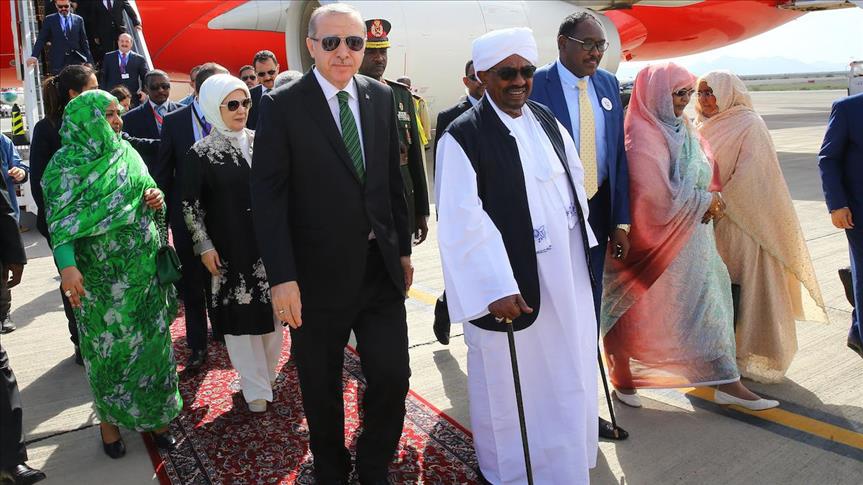
By Mohammed Amin
KHARTOUM
Recent military and economic cooperation between regional actors -- especially Turkey and Sudan -- will likely change the geopolitics of the Red Sea region, analysts say.
According to experts, the recent increase of Turkish influence in and around the Red Sea region appears to have irked some of these actors, including Egypt, Saudi Arabia and the United Arab Emirates (UAE).
They believe that the Gulf rift that began in the summer of 2017, which has since led to a deep split throughout the entire Middle East, has had an unprecedented impact on Red Sea geopolitics.
While Turkey has supported Qatar, Khartoum has maintained a neutral stance between the two rival camps.
Following last year’s historic visit to Sudan by Turkish President Recep Tayyip Erdogan, the two countries have striven to increase their overall trade volume from $500 million to $10 billion.
They have also signed 12 separate cooperation agreements in the fields of security, tourism and military cooperation, while Turkey was contracted to rebuild a dilapidated Ottoman-era seaport on Sudan’s Suakin Island and a dock for civilian and military use.
Economic
Since Erdogan’s visit last December, the total trade volume between the two countries has doubled, former Sudanese investment minister Mubarak al-Fadil recently told Anadolu Agency.
Al-Fadil said Turkey had become one of the primary investors in Sudan, adding that the two countries’ total trade volume had already risen from $500 million to some $2 billion.
According to a recent report by Sudan’s Investment Ministry, Turkish investment in Sudan reached $2 billion last year, with 288 Turkish-funded projects currently underway in the country.
Sudanese imports from Turkey include electronics, automotive parts, boilers, steel equipment, plastic products, textiles and paper.
Turkish imports from Sudan, meanwhile, include oilseed and fruit, sugar and sugar products, unfinished leather, resin and cotton.
This year has reportedly seen large inflows of Turkish investment into Sudan, along with several top-level visits between the two sides by economic and political officials.
In March, Turkish company Summa signed a $1.15-million deal with Sudan to build a new international airport in Khartoum.
Four months later, Turkish Economy Minister Nihat Zeybekci and Sudanese Trade Minister Hatim al-Sir Ali signed an association agreement aimed at boosting bilateral trade.
And in September, the Turkish Petroleum Corporation (TPAO) won a concession to search for oil in Sudan.
What’s more, Sudan has allocated some 12,500 hectares of land to Turkish companies since 2014 for use in various agricultural investment projects.
Military
Following a meeting with Turkish Defense Minister Hulusi Akar last week, Sudanese President Omar al-Bashir said bilateral military ties would be vastly enhanced in the coming period.
Security expert Ahmed al-Tuhami told Anadolu Agency that Sudan would accrue numerous benefits from stepped-up military cooperation, which, he said, would serve to “empower” Sudan vis-à-vis its regional rivals.
It would also allow the Sudanese military to benefit from Turkish experience, training and military know-how, he added.
“This military partnership will also help Sudan safeguard its own security in an already tumultuous region,” al-Tuhami said.
“The Sudanese-Turkish alliance is not a hostile one; it is not aimed against any particular regional actor,” he stressed.
“Rather, it will help maintain regional and international peace and security and serve to deter cross-border crime, terrorism, illegal migration and drug trafficking,” al-Tuhaimi said.
Suakin Island
As part of the agreements signed during Erdogan’s visit last year, Turkey leased Sudan’s Red Sea island of Suakin for 99 years with a view to developing its Ottoman-era seaport as a tourism hub.
Some analysts, however, believe that Saudi Arabia and its allies fear that Ankara also entertains military ambitions in the region.
Sudanese officials, however, have repeatedly dismissed this assertion, saying Turkey has no intention of building a military base in Sudan.
Abdullah Musa, head of Suakin’s landowners association, however, says Turkey’s planned activities on the island may run into some obstacles in terms of land ownership.
Musa went on to tell Anadolu Agency that the association had recently learned that several Emirati investors had also expressed interest in leasing land on the strategic island.
Red Sea rift
Abdul Wahab al-Afandi, a Sudanese scholar at the University of Westminster, believes the ongoing rift between Arab Gulf States has created a “new political atmosphere” in the region, which, he believes, has “reflected negatively” on states of the Horn of Africa region.
“The Saudi camp includes the UAE and Bahrain, with the support of Egypt, Israel and the U.S.,” al-Afandi told Anadolu Agency.
“The Qatari camp, meanwhile, enjoys the support of Turkey, along with tacit support from Iran,” he added.
The ongoing rivalry, al-Afandi explained, has extended to several African states, especially those along the Red Sea, such as Sudan, Eritrea, Djibouti and Somalia.
“Turkey is an influential player throughout the region and therefore must be taken into consideration, both geopolitically and economically,” he said.
“That’s why the Turkish presence on Suakin -- or in other strategic areas -- will continue to be of concern to major Red Sea actors, especially Egypt and Saudi Arabia,” he concluded.
Anadolu Agency website contains only a portion of the news stories offered to subscribers in the AA News Broadcasting System (HAS), and in summarized form. Please contact us for subscription options.







